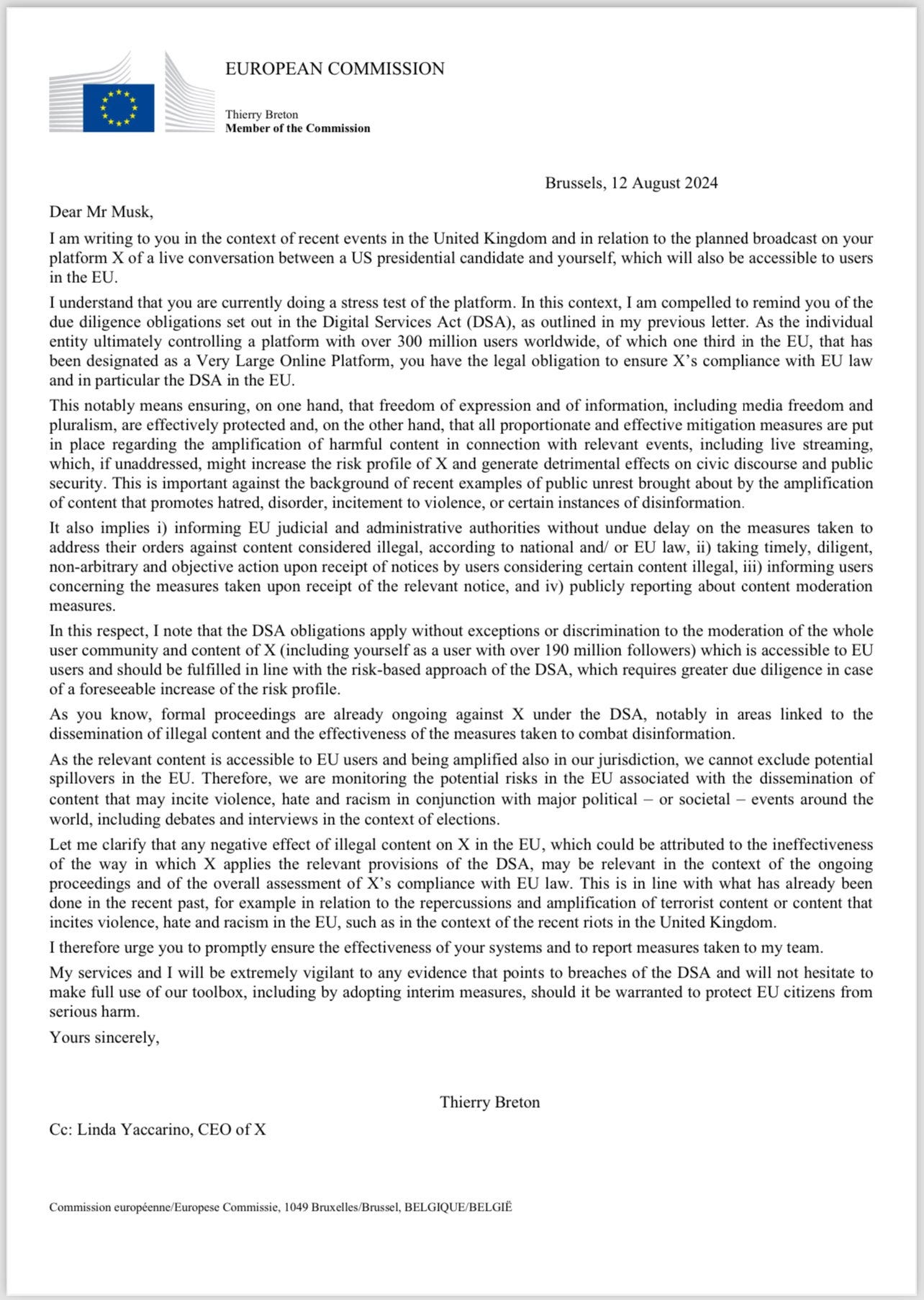On Monday (12th August), EU Internal Market Commissioner Thierry Breton published an open letter to Elon Musk on Twitter/X, warning Musk to take measures to contain “harmful content.” Addressing himself to Musk, Mr Breton said he was writing “in the context of recent events in the United Kingdom and in relation to the planned broadcast on your platform of a live conversation between a US presidential candidate and yourself, which will also be accessible to users in the EU.”
Now, on its face, it sounds reasonable that platforms should have to restrict “harmful content.” If we were dealing with things like child pornography or terror plots, we could understand that Twitter/X is under a legal obligation to remove harmful content. However, it is much harder to understand how a social media platform could reasonably find itself under a legal obligation to remove or restrict a public interview with a U.S presidential candidate. What could be the vital public interest that would justify curtailing political discourse of that nature?
Want to help get the word out? Click here to share this post on Twitter/X.
It is surprising, and unprecedented, for an EU Commissioner to comment publicly on a high-profile, public-interest interview, in a way that clearly suggests a desire to restrict its content. Indeed, so surprising that the Commission issued a statement, reported in the Financial Times, distancing itself from Breton’s outburst. That does not mean that the Commission is a fervent defender of free speech. But they probably understood that Breton was making the EU look like a grumpy dictator that wanted its political enemies censored. Grumpy dictators don’t like to look like grumpy dictators.
How exactly might the Musk-Trump interview fall foul of the Digital Services Act? Well, the Digital Services Act considers “harmful” content in need of “mitigation measures” to include, among other things, “incitement to hatred,” threats to “civic discourse,” the threat of “misinformation” and “disinformation,” and threats to “public security.” All of these terms are notoriously ambiguous and open to politically loaded and self-serving interpretations. They could easily be stretched to include a political interview with a U.S. presidential candidate.
For terms such as “disinformation,” “hate speech,” and “civic discourse,” are essentially political terms, not legal terms. They have no clear and widely accepted meaning in the law and certainly none in the context of lively public debates. As such, it was only a matter of time before they would be used to further the political ideology and interests of the European Commission.
By sending Musk this bizarre letter, Breton has done us all a favour: he has proved to us that the authoritarian potential latent in the Digital Services Act is not just something a few nay-sayers dreamed up, but something as real as the glasses on Mr Breton’s nose. Breton has demonstrated, rather theatrically, that the Commission is not a neutral guardian of the public sphere, but a political actor interested in suppressing opposing viewpoints, by stretching the notion of “illegal content” to bring within its purview a high-profile interview with a U.S. presidential candidate. That bizarre outcome was already built into the Digital Services Act, which was laced with imprecise terminology just waiting to be harnessed to the partisan political purposes of EU censors.
I do not believe for a second that Thierry Breton genuinely worries that EU citizens may be harmed by being exposed to a live interview with Donald Trump. However, assuming, for the sake of argument, that Breton thinks Europeans cannot handle being exposed to such an interview, then he must think very little of European citizens. I, for one, do not feel the need to be “protected” from the content of an interview with a U.S. presidential candidate, and I would find it insulting that anyone would think otherwise. This is an interview of public interest and an interview that European citizens have a right to hear.
Perhaps Thierry Breton needs to be reminded that no matter how many fudgy terms like “disinformation,” “civic discourse” or “public security” that he may like to use to rationalise censorship, he too is bound by the law, and he is bound by the EU Charter of Fundamental Rights, which protects Europeans’ freedom of expression and information. Article 11 reads:
Everyone has the right to freedom of expression. This right shall include freedom to hold opinions and to receive and impart information and ideas without interference by public authority and regardless of frontiers.
So when Thierry Breton suggests that a public interview with a presidential candidate is something that should trigger censorship, or something that should be restricted in the name of protecting “civic discourse,” he is protecting nobody but himself and those ideologically and politically aligned with the European Commission. In attempting to deprive citizens of the right to access public-interest broadcasts unimpeded by political censorship, Mr Breton has proved, once again, that he is the enemy of democracy, the enemy of constitutionalism, and the enemy of freedom of speech.
You can support independent commentary and analysis by upgrading to a paid subscription today, if you have not done so already.
Don’t forget that you can also find me on Twitter/X, Youtube, and Telegram. My academic profile and publications are listed at davidthunder.com.







I think one of the super important points you make here is the obvious contradiction between the EU Charter of Fundamental Rights:
"Everyone has the right to freedom of expression. This right shall include freedom to hold opinions and to receive and impart information and ideas without interference by public authority and regardless of frontiers."
and the DSA:
"Well, the Digital Services Act considers “harmful” content in need of “mitigation measures” to include, among other things, “incitement to hatred,” threats to “civic discourse,” the threat of “misinformation” and “disinformation,” and threats to “public security.”"
Is the EU Charter of Fundamental Rights like the US Bill of Rights, in that I can go to court about the government infringing my First Amendment Rights? Or is EU Charter of Fundamental Rights just a list of things that would be nice for the citizens as long as the list isn't impeding the government?